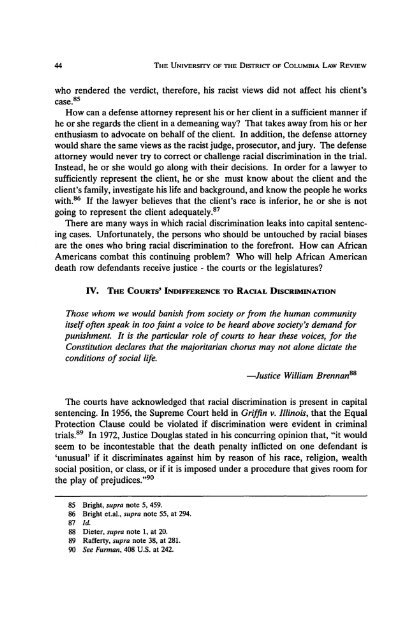44 THE UNIVERSITY OF THE DISTRICf OF COLUMBIA LAW REVIEWwho rendered <strong>the</strong> verdict, <strong>the</strong>refore, his racist views did not affect his client'scase. 8SHow can a defense attorney represent his or her client in a sufficient manner ifhe or she regards <strong>the</strong> client in a demeaning way? That takes away from his or herenthusiasm to advocate on behalf <strong>of</strong> <strong>the</strong> client. In addition, <strong>the</strong> defense attorneywould share <strong>the</strong> same views as <strong>the</strong> racist judge, prosecutor, and jury. <strong>The</strong> defenseattorney would never try to correct or challenge racial discrimination in <strong>the</strong> trial.Instead, he or she would go along with <strong>the</strong>ir decisions. In order for a lawyer tosufficiently represent <strong>the</strong> client, he or she must know about <strong>the</strong> client and <strong>the</strong>client's family, investigate his life and background, and know <strong>the</strong> people he workswith. 86 If <strong>the</strong> lawyer believes that <strong>the</strong> client's race is inferior, he or she is notgoing to represent <strong>the</strong> client adequately.87<strong>The</strong>re are many ways in which racial discrimination leaks into capital sentencingcases. Unfortunately, <strong>the</strong> persons who should be untouched by racial biasesare <strong>the</strong> ones who bring racial discrimination to <strong>the</strong> forefront. How can AfricanAmericans combat this continuing problem? Who will help African Americandeath row defendants receive justice - <strong>the</strong> courts or <strong>the</strong> legislatures?IV. THE COURTS' INDIFFERENCE TO RACIAL DISCRIMINATIONThose whom we would banish from society or from <strong>the</strong> human communityitself <strong>of</strong>ten speak in too faint a voice to be heard above society's demand forpunishment. It is <strong>the</strong> particular role <strong>of</strong> courts to hear <strong>the</strong>se voices, for <strong>the</strong>Constitution declares that <strong>the</strong> majoritarian chorus may not alone dictate <strong>the</strong>conditions <strong>of</strong> social life.-Justice William Brennan 88<strong>The</strong> courts have acknowledged that racial discrimination is present in capitalsentencing. In 1956, <strong>the</strong> Supreme Court held in Griffin v. Illinois, that <strong>the</strong> EqualProtection Clause could be violated if discrimination were evident in criminaltrials. 89 In 1972, Justice Douglas stated in his concurring opinion that, "it wouldseem to be incontestable that <strong>the</strong> death penalty inflicted on one defendant is'unusual' if it discriminates against him by reason <strong>of</strong> his race, religion, wealthsocial position, or class, or if it is imposed under a procedure that gives room for<strong>the</strong> play <strong>of</strong> prejudices. ,,9085 Bright, supra note 5, 459.86 Bright et.al., supra note 55, at 294.87 Id.88 Dieter, supra note 1, at 20.89 Rafferty, supra note 38, at 281.90 See Furman, 408 U.S. at 242.
CAPITAL PUNISHMENT: 21ST CENTURY LYNCHING 45Despite <strong>the</strong> Supreme Court's acknowledgment <strong>of</strong> racial discrimination's presencein <strong>the</strong> capital sentencing process, <strong>the</strong> Court has set a high standard for defendantsto challenge such discrimination. In McCleskey, <strong>the</strong> Court held thatracial discrimination must be proved by showing intentional discrimination, instead<strong>of</strong> discriminatory impact. <strong>The</strong>refore, <strong>the</strong> defendant must prove that <strong>the</strong>"purposeful discrimination 'had a discriminatory effect' on him. ,,91 This is nearlyimpossible to do, unless <strong>the</strong> defendant has concrete evidence specific to his trialthat persons acted in a racial discriminatory manner. However, even in cases inwhich a defendant has concrete evidence <strong>of</strong> blatant racial remarks made by <strong>the</strong>judge, prosecutor, jury, or defense counsel, <strong>the</strong> courts have held that <strong>the</strong>ir actionsdid not affect a defendant's trial. Statistics can only be used to show intent when<strong>the</strong> disparate impact is "'so strong as to lead inevitably to finding <strong>of</strong> motivationand intent, absent some o<strong>the</strong>r explanation. . .' ,,92 So, where does that leave adefendant? Nowhere. It is like a never ending circle.<strong>The</strong> courts have also refused to require that prosecutors provide explanationsfor <strong>the</strong>ir decisions to request <strong>the</strong> death penalty. A prosecutor is only required toprovide an explanation for his or her decision when a defendant establishes aprima facie case <strong>of</strong> unconstitutional conduct with respect to his case. 93 A primafacie case is established when a defendant proves that (1) "he is a member <strong>of</strong> agroup that is a recognizable, distinct class, singled out for different treatment,"(2) "that <strong>the</strong>re is a substantial degree <strong>of</strong> differential treatment," and (3) "showthat <strong>the</strong> alleged discriminatory procedure is susceptible to abuse or is not raciallyneutral. ,,94 <strong>The</strong>refore, a prosecutor is allowed to use his or her wide discretion inwhatever manner he or she wants, even if it is racially discriminatory.<strong>The</strong>re have been cases in which <strong>the</strong> courts have overturned capital punishmentsentences. However, <strong>the</strong> courts never mention that <strong>the</strong> cases were overturneddue to findings <strong>of</strong> racial discrimination. It is as if <strong>the</strong> courts are afraid to state in<strong>the</strong>ir opinions that racial discrimination is apparent in capital sentencing cases.What are <strong>the</strong> courts trying to do? Are <strong>the</strong>y covering up <strong>the</strong> truth? <strong>The</strong> courts donot want to "rock <strong>the</strong> boat." <strong>The</strong>y are afraid <strong>of</strong> upsetting <strong>the</strong> majority by giving<strong>the</strong> minority groups an avenue to challenge legal lynching.<strong>The</strong> federal courts <strong>of</strong>fered minorities <strong>the</strong> greatest hope <strong>of</strong> overcoming racialdiscrimination. However, due to <strong>the</strong> Supreme Court's reluctance to provide aremedy for racial discrimination in capital sentencing cases-that hope has beendiminished. <strong>The</strong> Court has sent a message that <strong>the</strong> courts are "no longer interestedin protecting <strong>the</strong> rights <strong>of</strong> minorities."9591 See McCleskey, 481 U.S. at 292.92 Meinert, supra note 40, at 1203.93 See McCleskey, 481 U.S. 279, 297 (citing Batson v. Kentucky, 476 U.S. 79 (1986».94 See id. (citing Batson, 476 U.S. at 94).95 Bright, supra note 5, at 437.














